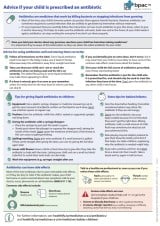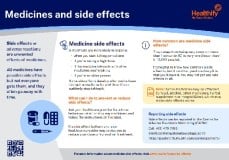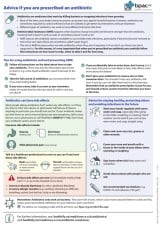You can now add Healthify as a preferred source on Google. Click here to see us when you search Google.
Rifampicin
Key points about Rifampicin
- Rifampicin is used to treat and prevent tuberculosis (TB).
- It's also used to prevent other infections such as meningitis or Haemophilus influenzae, if you've been in close contact with someone who has the infection.
- Find out how to take rifampicin.

Rifampicin is mainly used to treat and prevent tuberculosis (TB). TB is an infection which mostly affects the lungs, but which can affect any part of your body. TB is treated by taking a combination of antibiotics for at least 6 months – rifampicin is just one of the antibiotics prescribed. Read more about TB.(external link)
Rifampicin is also used to prevent other infections such as meningitis or Haemophilus influenzae, if you've been in close contact with someone who has the infection. It may also be used to control itching for people with severe liver disease.
In Aotearoa New Zealand rifampicin is available as capsules (150mg and 300mg) and a liquid syrup.
- Always take rifampicin exactly as your doctor has told you. The pharmacy label on your medicine will tell you how much to take, how often to take it and any special instructions.
- The dose of rifampicin is different for different people, depending on what it's being used for, and how much you weigh.
- Read what to do if you think a child or someone else has taken a medicine that's not for them.
- Timing of your dose: Take your rifampicin dose once a day on an empty stomach at least 30 minutes before or 2 hours after food. Swallow the capsules whole with a glass of water. Measure the liquid carefully with an oral syringe or measuring spoon. Shake the bottle well before measuring each dose. Don't take indigestion remedies, iron or calcium preparations within 2 hours of taking this medicine.
- Missed dose: If you forget to take your dose, take it as soon as you remember. But if it's nearly time for your next dose, take the next dose at the right time. Don't take extra doses to make up for a forgotten dose.
- Finish the course. If you're taking rifampicin to treat TB, you'll be asked to take it every day for 6 months. Continue to take it every day unless your doctor tells you to stop. It's important for you to finish the course so the infection doesn't come back. If you stop taking the medicine (such as if you think you may be developing side-effects – see below) then you must let your doctor know about it straightaway so that you can be given different treatment for your TB.
Here are some things to know when you're taking rifampicin. Other things may be important as well, so ask your healthcare provider what you should know about.
- This medicine may colour your teeth, urine, saliva and other body secretions a yellow, orange, red, or brown colour. This is harmless.
- If you wear soft contact lenses, rifampicin can discolour or stain your lenses. Talk to your doctor or optician about this. A different type of contact lens may be more suitable for you, or you may choose to wear glasses while you're being treated.
- Rifampicin can interact with some medicines, herbal supplements and rongoā Māori, so check with your doctor or pharmacist before starting rifampicin and before starting any new products.
- Tell your doctor if you're pregnant, planning to become pregnant, or breastfeeding. If you're taking birth control pills, extra care is needed as rifampicin may affect how they work. Talk to your doctor about suitable contraception. You may need to use additional birth control methods while taking rifampicin, and for four weeks after stopping.
- Limit alcohol while you are taking rifampicin. Alcohol can increase your chance of side effects such as problems with your liver.
- Tell your doctor if you have diabetes, epilepsy, HIV, or problems with your kidneys or liver.
Like all medicines, rifampicin can cause side effects, although not everyone gets them. If you're concerned about any symptoms you think might be related to your medicine, talk to your healthcare provider. The following information offers some guidance but doesn't include all possible side effects.
Common side effects
Tell your healthcare provider if these side effects bother you:
- Nausea (feeling sick) or sore tummy.
- Itching.
- Headache.
- Muscle weakness or pain.
- Feeling dizzy.
Tell your healthcare provider immediately or phone Healthline free on 0800 611 116 if these occur
- Flu-like symptoms such as fever, chills.
- Bone pain.
- Signs of problems with your liver such as severe tummy pain, yellowing of the eyes and skin, dark urine.
- Signs of problems with your lungs such as new or sudden worsening of shortness of breath, possibly with a cough or fever.
- Signs of problems with your blood cells such as easy or unusual bruising or bleeding.
- Red or purple spots on your skin that show up for no reason.
Phone 111 for an ambulance or go to your nearest accident and emergency (A&E) clinic if these occur
- Signs of an allergic reaction such as itchy skin, and rash, swollen lips or tongue, problems breathing, like a tight chest or shortness of breath.
Read more about medicines and side effects and reporting a reaction that you think might be a side effect.
The following links have more information about rifampicin:
Rifampicin(external link) New Zealand Formulary Patient Information
Brochures
Advice if you are prescribed an antibiotic(external link) BPAC, NZ, 2024
Advice if your child is prescribed an antibiotic(external link) BPAC, NZ, 2024
Medicines and side effects(external link) Healthify He Puna Waiora, NZ, 2024
References
- Rifampicin(external link) New Zealand Formulary
Brochures

Advice if your child is prescribed an antibiotic
BPAC, NZ, 2024

Medicines and side effects
Healthify He Puna Waiora, NZ, 2024
Credits: Sandra Ponen, Pharmacist, Healthify He Puna Waiora. Healthify is brought to you by Health Navigator Charitable Trust.
Reviewed by: Angela Lambie, Pharmacist, Auckland
Last reviewed:






